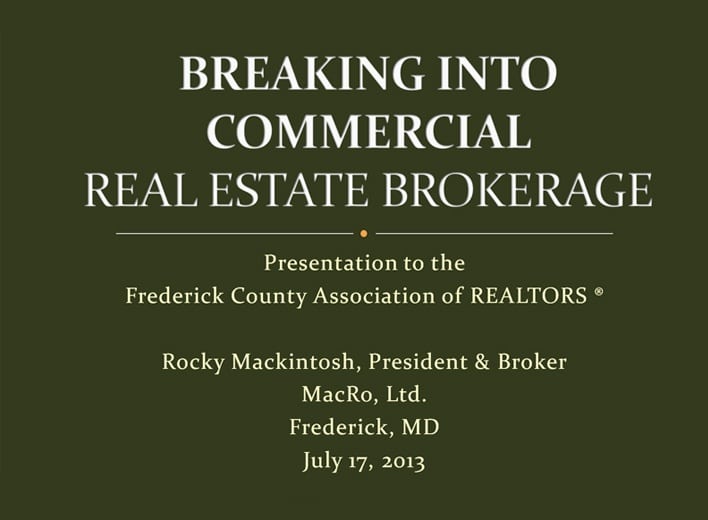There are many who say that one must be a bit crazy to play in the CRE game!
Several months ago, I was asked to give a presentation to the Frederick County Association of Realtors® on how one could “ease into” Commercial Real Estate Brokerage from a career of residential brokerage.
Being a loyal member of FCAR for nearly all of my 40 plus years in the real estate business, I accepted the challenge. Back in my early years, I too sold a bunch of houses … and did in fact make the switch about ten years into my career.
As things went, in 1980 I started and ran a general real estate brokerage business that did it all, but it was my jump in 1990 into my current venture MacRo, Ltd., that I made a full break from being associated with the business of selling houses.
It is true that any number of very successful Commercial Real Professionals wet their whistle in the residential world.
So, does that mean that transition is an easy thing to do?
Is it just a matter of marketing a different product type?
Well … not so much. While some can make the complete switch, the majority of those who try do not.
When I first committed to give this talk, I assumed it would be a quick 20 minute presentation, not unlike one that a guest speaker would give at a Rotary meeting.
Maybe I wasn’t paying attention to a earlier memo, but a week before the big day, I was reminded that I had committed to give a two hour overview of how one can break into the world of CRE brokerage.
As it turned out, with a little help from some good reference material … and access to a couple of my favorite CRE bloggers, I was able to cut through some of the cobwebs of my mind to develop an outline that was pretty well received by a packed house of CRE wannabes.
Here’s the link to the Power Point Presentation.
The first question many have is “What exactly is Commercial Real Estate?”
My definition is that it is any real estate that is NOT sold or leased to people who seek a place to live in. In other words: single family residential homes, townhouses, condominiums, apartments, whether as a primary or vacation home.
 Twist that a bit to the development of or the investment in these properties for a profit, and now they qualify as CRE. In addition and more closely aligned with the definition is income related real estate (i.e., shopping centers, retail pad sites, industrial and office buildings, hotels, multifamily apartment buildings), real estate sold or leased for development, and business brokerage.
Twist that a bit to the development of or the investment in these properties for a profit, and now they qualify as CRE. In addition and more closely aligned with the definition is income related real estate (i.e., shopping centers, retail pad sites, industrial and office buildings, hotels, multifamily apartment buildings), real estate sold or leased for development, and business brokerage.
Where does one go to learn about the commercial real estate brokerage business, no as my friend Duke Long says there are no online videos or correspondence courses that are available and no one ever “took a two-day seminar class created a twitter account and took over the CRE world.”
While the physical and structural side of understanding residential real estate may be complex to a newcomer in that business (housing types, architectural styles, public versus well water, covenants and homeowner associations), CRE is all that and more on steroids … consider taking the following CRE Term Quiz that I offered to the class.
What is the difference between a Cap Rate and an End Cap? Or how about Break Point versus Basis Point? … FAR and IRR? Let us not forget a Sandwich Lease and Leakage!
Of course this list of 44 words and acronyms only represents a fraction of the terminology found in every branch of the CRE business … to give you a taste of what all the gibberish means, click here for the answers.
There is a lot to learn, even for the old guys who should probably be locked up in Room 237 of the Overlook Hotel only to be visited after they have vaporized into apparitions of boastful beings from another era.
Every branch of the this business has its own set of terms.
Then there is the necessity of understanding the public utility, zoning and subdivision regulations (to name a few) in each jurisdiction within you plan to carry out your business … and what the heck is an impact fee anyway?
But at its core the Commercial Real Estate brokerage business, not unlike residential brokerage, is about who you know and the relationships that are developed over time. It’s about the broker’s familiarity with the market, product knowledge and reputation for service. This is what builds credibility … and a successful career.
Commercial real estate brokerage is a seriously competitive business. Established CRE brokers have no patience for part-timers or novices. While it exists, cooperation among these folks is earned … it’s all about respect.
How hard are you willing to work, and in the end what will you have to show for it?
That stated, there are several different ways in which one can break into the business. In an ideal world it is best not to take your time to transition from residential to commercial. Find the courage and ways and means of making the break and dive in hard.
If you are new to the real estate brokerage world and have a eye on a future career in CRE, find out if you have what it takes and jump in!
In a field that appears to be closed to newcomers, there are bountiful opportunities with brokers who seek young blood. Most big regional and national CRE shops have established programs for newbies — they show you the ropes, make you a water boy (or girl) for a team that specializes in one field, pay nearly nothing (if anything) and require that you make cold calls until Hell freezes over! (by the way … that is the secret to success!)
Once your prove your worth … then the money comes your way.
Brokers in smaller boutique firms or teams (if they are in the market for people to carry their buckets) may be willing to mentor new folks, offering opportunities to job shadow … be that fly on the wall you always wanted to be.
Large shop or small shop, to be a success you will enter a world of entrepreneurs who work long hours.
If you are an introvert who is risk averse, cares not for the stress of a very fast pace and/or wishes not to live below your means for a few years … Please, don’t waste your time.
… Oh, and what about the income? As shown in the presentation material, in 2012 there was a total 124 sale transactions made totaling $197 million dollars in commercial real estate deals. Add to that another 116 leasing transactions for about 550,000 square feet of commercial space.
Let’s assume that most of these transactions involved the services of commercial real estate brokers. My best conservative guess (and that is all I can do here) is that between $6,000,000 to $8,000,000 (maybe as high as $10,000,000) in net brokerage fees (after non-brokered deals and house cuts are deducted) are were paid out in a twelve month period. Another wild guess is that there are probably about 150 commercial brokers who engage in the Frederick CRE business – from all over the region. On average the net earnings for those poor saps came out to be as low as $45,000 … slim pickin’s?
If that’s all one can earn, CRE Brokers have got to be crazy! Right?
In reality only a small handful of Commercial Real Estate brokers were responsible for the lion’s share of those transactions — they are the ones who reap the rewards.
Hard work … building strong relationships … providing high quality customer service … earns credibility … and a pretty good income!
That’s all it takes!
Any questions?
The author: Rocky Mackintosh, President, MacRo, Ltd., a Land and Commercial Real Estate firm based in Frederick, Maryland. Many of his articles also appear in TheTentacle.com

